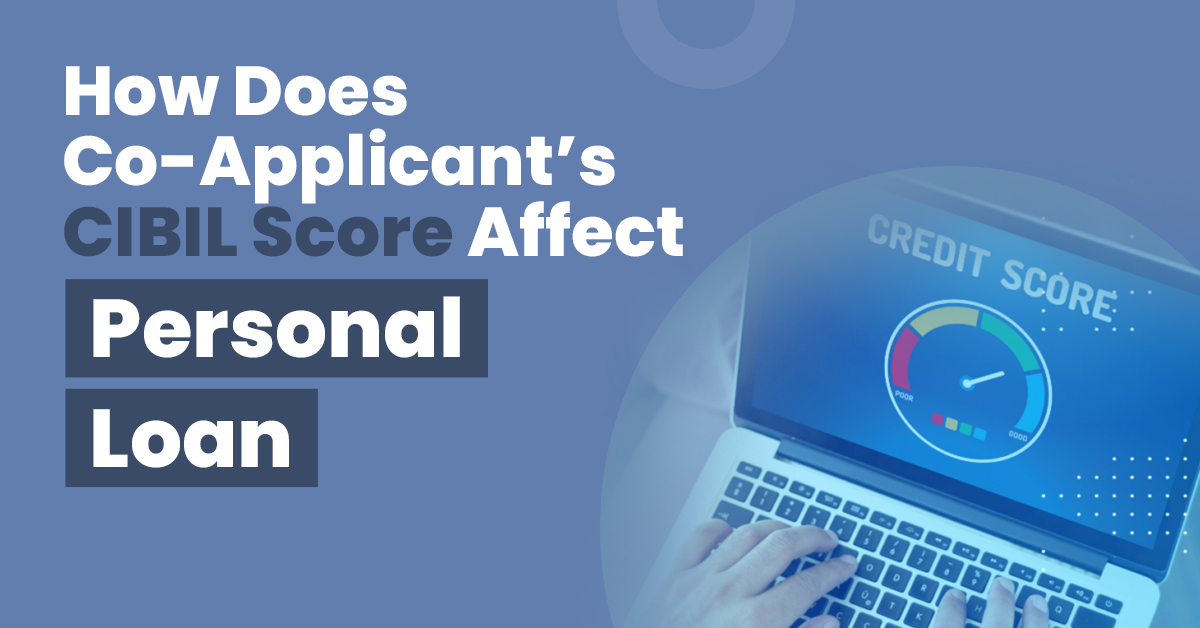How Does a Co-Applicant CIBIL Score Affect Your Personal Loan Application?


As we know, lending institutions check an individual’s CIBIL scores before approving a loan application because the terms of the sanctioned loan, including the loan amount and interest rate, depend on the borrower’s CIBIL score.
However, a borrower may fall short of the standard credit limit or need a higher loan amount. In such cases, you can opt for a joint loan application with a co-applicant, which usually is a family member.
If you consider using a co-applicant for your loan application, you must first consider their CIBIL score. But why is it so important? The following sections will help you understand.
What Is CIBIL Score?
Credit Information Bureau (India) Limited (CIBIL) is a credit information firm that assigns a three-digit number to an individual’s credit report. This number acts as a score to represent your creditworthiness in the eyes of lenders. It allows lenders like banks and NBFCs to determine whether you are fit to receive a loan depending on your past credit-related behaviour.
Anyone who uses credit can earn or lose their CIBIL score, depending on their credit behaviour. For example, while repaying your debts on time increases your CIBIL score, failing to make payments or multiple enquiries in CIBIL decreases the score.
These scores range from 300 to 900 on a regular scale. However, lenders usually consider 720-750 as a good score to determine an individual’s eligibility for a personal loan. It is important to note that the minimum credit score requirements vary between different lenders.
What Factors Determine Your CIBIL Score?
TransUnion CIBIL considers certain factors in determining your CIBIL score with time. The list below highlights some important points affecting your CIBIL score.
Credit Mix
Credit mix is when an individual has several ongoing credits. Having a diversified report of different types of credit reflects that you can balance several loans together. If your credit report highlights that you are maintaining your credit mix by timely repayment, your CIBIL score will increase.
It is important to note that the more diversified your credit report is, the better the chance your score will grow because the credit mix has a 10% contribution to your CIBIL score.
Credit History
A long history of repaying loans assures lenders that you will maintain and repay your loans on time.
Repayment History
Your repayment history makes up 35% of your CIBIL score. If you repay your debts on time, your CIBIL score is bound to increase. However, it can fall if you miss one date or pay the loan a day later.
Credit Inquiries
When you opt for a new credit, CIBIL conducts a hard inquiry. Several such credit checks can reduce your CIBIL score.
Because CIBIL will consider that you are too dependent on loans, your CIBIL report will highlight your new credit application and the hard inquiry. Therefore, consecutive credit applications and inquiries can lower your score significantly.
Why Would You Need a Co-Application for a Personal Loan?
Very often, lenders suggest opting for co-application for a personal loan. However, by applying with one of your family members or trustworthy acquaintances, you can improve your chances of accepting your loan application.
Such instances occur when your CIBIL score is slightly lower than the cut-off score. With a co-applicant, you can get a personal loan at a relatively low-interest rate (provided the co-applicant has a good credit score). However, lenders also verify your co-applicants CIBIL score in such cases. Lenders will approve your application at a low-interest rate if the co-applicant has a healthy score.
How Does the Co-Applicant’s CIBIL Score Impact a Loan Application?
When you apply for a personal loan with a co-applicant, their credit report will directly affect your loan application. Therefore, you should always choose your partner wisely in such instances.
The points below discuss how a co-applicant CIBIL score can impact your loan application:
Loan Eligibility
The combined CIBIL score of you and your co-applicant can boost your eligibility for a personal loan in the lender’s eyes. However, you must remember that both of you must have a healthy CIBIL score to sanction a loan with a lower interest rate.
Impact on Main Applicant’s Credit History
While applying for a joint loan, both co-applicants are responsible for repaying the debt. If one defaults, it reflects on the credit history of both applicants. As a result, your CIBIL score can fall. Therefore, choosing a co-applicant with a disciplined credit record is necessary.
Low CIBIL Scores Mean High-Interest Rates
Opting for joint loans with individuals with high CIBIL scores is important. Suppose one of your CIBIL scores is below the limit. In that case, lenders will sanction your loan with a higher interest rate or longer tenure because they will consider both applicants risky investments per their CIBIL numbers.
Final Words
A co-applicant’s CIBIL score certainly has an impact on your personal loan application. Co-applying for a personal loan can be wise if you have the right partner. Repaying your loan timely will increase both co-applicants’ CIBIL scores. Therefore, you must choose your co-applicant after checking their income, financial standing, liabilities and CIBIL score.
Frequently Asked Questions (FAQs)
What is the debt-to-income ratio?
Lenders tend to analyse a borrower’s debt repayment capacity against their gross income/profits using debt-to-income ratio. In simple terms, the debt-to-income ratio is the percentage of an individual’s monthly income that one uses to pay their debts.
When should you not opt for a co-applicant?
If your co-applicant has a higher or similar debt-to-income ratio as yours, it is better to avoid co-applying with them. It is also applicable if the co-applicant has a lower CIBIL score than you. It will decrease your chance of getting a loan approval.
Does being a co-applicant affect my CIBIL score?
If the main applicant fails to pay an EMI, the CIBIL score will fall drastically. In such cases, you may have to consider repaying the loan on the main applicant’s behalf.



